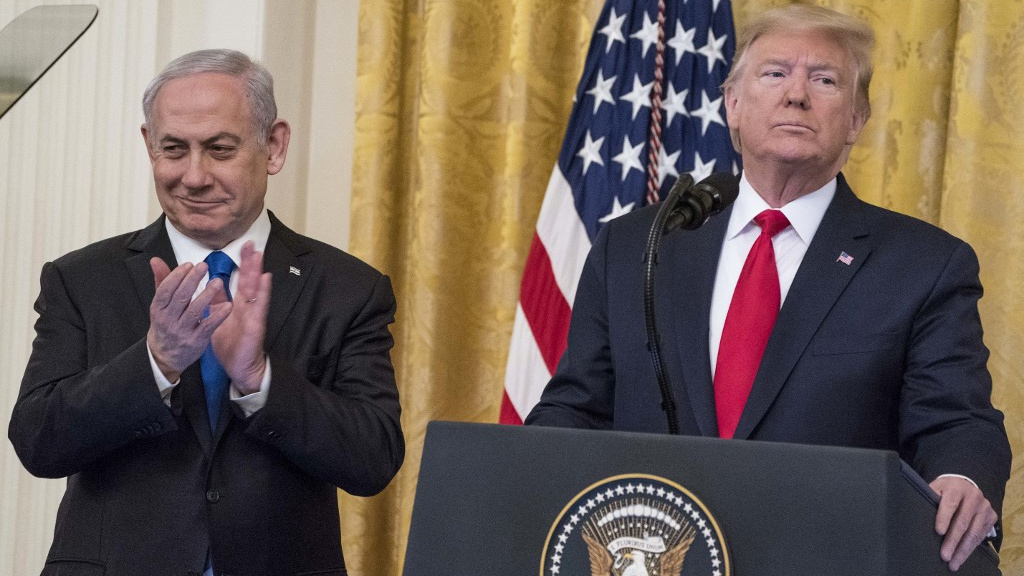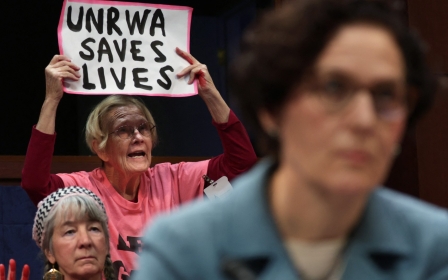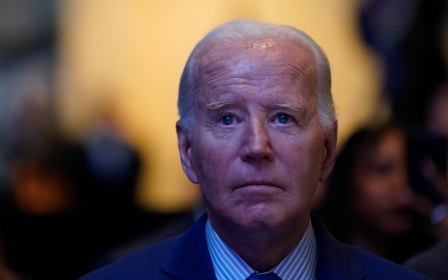War on Gaza: Zionist land-grabbing strategy will never achieve peace

In late January, Palestinians around the world watched as the International Court of Justice (ICJ) ordered Israel to prevent genocide in Gaza, amid an ongoing war that has killed more than 27,000 people. Israeli Prime Minister Benjamin Netanyahu has sought to justify this by asserting that the war will eradicate Hamas.
The ICJ case raised Palestinian hopes that the war would end and Israel would be held accountable for its crimes. Instead, Israel has continued its relentless attacks, with Gaza at the brink of famine.
Ordinary people in the West are well aware of the catastrophe that is unfolding, as horrific images from the ground are live-streamed and shared on social media.
In Gaza, Palestinians are preoccupied with escaping death and fighting hunger, with many still living in tents. Civilians are being repeatedly targeted by Israeli bombardment, including while they move to so-called safe zones. Rain has flooded tents, as Palestinians struggle with a lack of food, clean water, proper sanitation and medicine.
In reflecting on ongoing events in Gaza, we see not only an unfolding human catastrophe, but a delayed justice lost in the meaning of resolutions and different interpretations.
Stay informed with MEE's newsletters
Sign up to get the latest alerts, insights and analysis, starting with Turkey Unpacked
This is what the Arabic proverb "a hand in the water is not like a hand in the fire" refers to- in this case, the difference between an ultimatum period in which Israel is politely asked to take steps, over a month, to reassure the 'international community' that it is not committing genocide, and the Palestinians in Gaza demand for the senseless death and human suffering to end, and to end now.
Although South Africa’s ICJ case marks an unprecedented step against a state that has long been granted impunity, Palestinians are understandably cautious, and even wary, of this legal initiative - not least because the global narrative on Palestinian “rights” has historically been characterised by deceit and the deployment of legal pretexts in the service of state power.
In 1917, the Balfour Declaration promised to establish a Jewish homeland in historical Palestine. In lieu of acknowledging the Palestinian people, it saw fit to invoke the “civil and religious rights” of non-Jews.
The ambiguous term “Jewish national home”, which was developed, cultivated and applied in order to conceal and deceive, has since been at the heart of the struggle between Palestinians and Zionist Jews. The Balfour Declaration and the events that followed ultimately cost Palestinians their homeland.
Double standards
During the British Mandate period, the government facilitated Jewish immigration while paying lip service to Palestinian demands. Several years after the 1936 Arab revolt, Britain issued a white paper that proposed to limit Jewish immigration, but this was little more than a belated attempt to appease Palestinians.
In an equally striking display of double standards, the US government and its western allies see fit to invoke the two-state solution amid the ongoing bloodshed and human misery in the occupied Palestinian territories, conveniently overlooking the growing settler population in the West Bank, alongside official Israeli calls for the transfer of Palestinians and the establishment of “Greater Israel”.
Follow Middle East Eye's live coverage of the Israel-Palestine war
Recently, more than two dozen Israeli politicians attended a conference that discussed the resettlement of Gaza. The concept of population transfer has been part of Zionism since its inception, and its influence remains very much alive today.
There are numerous historical examples. After the 1967 war, Israeli ministers considered relocating Palestinians en masse from Gaza to the Sinai. Israeli forces ultimately destroyed thousands of homes in Gaza refugee camps, and some residents were deported to the Sinai. Land was confiscated for the establishment of Israeli settlements.
There will never be full security or peace if Palestinian aspirations and political rights are ignored
Between 2000 and 2004, the Israeli army demolished more than 2,500 homes in Gaza, mostly in Rafah, on the border with Egypt. Around 16,000 Palestinians lost their homes as the Israeli army expanded the “buffer zone” in the south.
The Oslo Accords, signed in the 1990s, effectively picked up where the Balfour Declaration left off, couching its actual aims in ambiguity. By postponing the negotiation of a permanent settlement on borders, refugees and Jerusalem for a five-year period, the accords enabled Israel to create facts on the ground by increasing the occupied West Bank’s settler population, and working towards the Judaisation of Jerusalem.
Both were clearly at odds with Article 31, and more precisely its stipulation that nothing “shall prejudice or pre-empt the outcome of the negotiations on the permanent status to be conducted”.
Biased plans
Such ambiguity also appears in the texts and practices of broader international law. While the Fourth Geneva Convention establishes the illegality of settlements in occupied territory, it only under Chapter VII of the United Nations allows the UN Security Council to “determine the existence of any threat to the peace, breach of the peace, or act of aggression”, and to endorse or undertake the necessary military and non-military action to “restore international peace and security”.
In the absence of an explicit settlement freeze, the Oslo Accords did note that “the two sides view the West Bank and the Gaza Strip as a single territorial unit, the integrity and status of which will be preserved during the interim period”.
The Trump administration’s 2020 “Peace to Prosperity” plan was very much in line with the Balfour Declaration, not least because it was drafted without consulting Palestinians and with the full cooperation of the Israeli government.
Trump adviser Jared Kushner justified this by saying that Palestinians “need a little bit of time to take a cold shower and to kind of digest the plan and read it”. Netanyahu, for his part, made it clear that this was immaterial, asserting that “whether they accept it or not, it’s going to happen”.
Fast-forward several years, and on the day the ICJ issued its interim decision in the genocide case, both the US and Canada cut their funding to the UN Relief and Works Agency (Unrwa), on the basis of Israeli allegations that some of its employees were involved in the 7 October attacks.
US Secretary of State Antony Blinken acknowledged: “We haven’t had the ability to investigate [the allegations] ourselves. But they are highly, highly credible.”
This episode brings to mind President Joe Biden repeating the “beheaded babies” allegations shortly after the 7 October attacks, and the disregard shown when the US executive bypassed Congress to approve emergency military aid to Israel.
Collective punishment
Other European countries have also suspended Unrwa funding without waiting for the outcome of a UN investigation, despite this arguably being a form of collective punishment, which is prohibited by international law. It should also be noted that western countries have taken no action over Israel’s killing of more than 150 UN employees in Gaza.
For Palestinians, punitive measures precede investigations and due process. But for Israel, as displayed by its recent raid of a Jenin hospital and killing of three Palestinians, investigations and due process - let alone punitive measures - are not even a consideration.
Western officials have repeatedly turned a blind eye to open incitement by Israeli officials, including Defence Minister Yoav Gallant, who within days of the 7 October attack ordered a “complete siege” of Gaza, asserting that “we are fighting human animals”. They appeared similarly unperturbed when Heritage Minister Amihai Eliyahu suggested that a nuclear bomb could be dropped on Gaza.
Unrwa is responsible for providing humanitarian services in the Gaza Strip, where the majority of people are refugees or the descendants of refugees. Now, because of the western defunding, it will not be able to provide vital services at a time when the crisis in Gaza is intensifying every day. The US envoy to the UN has said funding would resume only after “fundamental changes” to Unrwa.
These latest measures can be understood as part of a long-term, calculated strategy. In 2018, the Trump administration cut off funding to Unrwa (a move later reversed by Biden), calling it an “irredeemably flawed operation”. The previous year, as part of a push to eliminate the category of “Palestinian refugees” entirely, Netanyahu said Unrwa should be “dismantled and merged with the United Nations High Commissioner for Refugees”.
Alongside ongoing efforts to misrepresent and grossly distort popular protests, the main - and perhaps only - hope for Palestinians are global grassroots solidarity groups that include Jewish participants. In the face of considerable challenges, including attempts to suppress and even criminalise them, they continue to assert Palestinian rights.
The Israeli state, meanwhile, appears to be out of answers, as the best its top political and military minds can offer is the establishment of a one-kilometre “buffer zone” around Gaza. Essentially, Israel is seeking to wall off the already walled-off territory.
This fits within the Zionist mindset of grabbing more land and pushing Palestinians into ever-smaller enclaves. There will never be full security or peace if Palestinian aspirations and political rights are ignored.
The views expressed in this article belong to the author and do not necessarily reflect the editorial policy of Middle East Eye.
Middle East Eye delivers independent and unrivalled coverage and analysis of the Middle East, North Africa and beyond. To learn more about republishing this content and the associated fees, please fill out this form. More about MEE can be found here.







